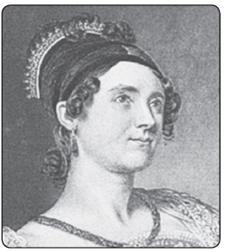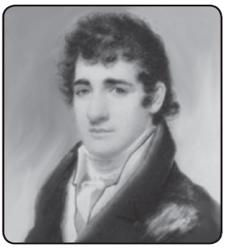History Buff's Guide to the Presidents (52 page)
Read History Buff's Guide to the Presidents Online
Authors: Thomas R. Flagel
Tags: #Biographies & Memoirs, #Historical, #United States, #Leaders & Notable People, #Presidents & Heads of State, #U.S. Presidents, #History, #Americas, #Historical Study & Educational Resources, #Reference, #Politics & Social Sciences, #Politics & Government, #Political Science, #History & Theory, #Executive Branch, #Encyclopedias & Subject Guides, #Historical Study, #Federal Government


Louisa Johnson first met her future spouse when she was four and he was twelve. Her father was an American diplomat, her mother an English aristocrat. Together they lived in Nantes, France, nervously awaiting the outcome of the American Revolution, when they met with consul John Adams and his young son. Reconnected on several other occasions, the families became close. In 1797, the twenty-two-year-old Louisa married the thirty-year-old John Quincy. She would follow him to Berlin, where he served for four years as the minister to Prussia. Worldly, fluent in several languages, she was immensely popular. When she came to the United States in 1801, her audience was less welcoming.
Mother-in-law Abigail Adams openly disliked her, believing that John Quincy could have married better. Others found her foreign birth to be worthy of suspicion. But when her husband moved into the Senate and later became secretary of state, she developed her inherent skills in diplomacy, compensating heavily for a spouse who was too brash and bookish to be effective in social settings. She stayed informed by watching Senate debates, one of the first women ever to do so. She also hosted weekly dinners for prominent guests. When her husband was mentioned as a possible candidate for the presidency in 1824, she staged a dinner party for sixty-eight congressmen to bolster his chances.
31
Her political skills were tested to their limits when John won the White House under the specter of the alleged C
ORRUPT
B
ARGAIN
of 1824. Without a clear mandate, his administration struggled. She attempted to calm animosities by resuming the custom of visiting legislators’ wives, taking several hours every day to traverse the unpaved streets of Washington and Georgetown. She publicly tried to dismiss rumors that her husband had supplied a mistress to the Romanov Court years before. At times, invitations to her White House parties were virtually ignored, as a slight against her husband rather than her. But by sheer diligence, and the willingness to be more congenial than the proud and confrontational John Quincy, she was able to maintain what little support he had left in government.
In 1828, Louisa worked harder than her husband to gain his reelection, and she was infuriated by the way Andrew Jackson’s supporters attacked them both. The following year proved even worse with the premature death of her troubled son G
EORGE
W
ASHINGTON
A
DAMS
. But she would return to prominence in Washington when John Quincy was elected to the House of Representative in 1830. A forgiving and generous person, she quickly reestablished old friendships and happily reconciled with those who had slighted her years before.
When Louisa Adams died in 1852, the Senate and House of Representatives adjourned for a day of mourning. It was the first time Congress had ever honored the passing of a former first lady.

“Madam, I may be President of the United States,” said Chester A. Arthur to an inquisitive citizen, “but my private life is nobody’s damn business.” Unfortunately for widower Arthur and his two children, the first family is America’s royalty by proxy and is therefore a popular subject for gossipers and journalists alike. Fortunately for the country, while some relatives have provided theatrics reminiscent of
The Taming of the Shrew
, none have roused a tragedy on the scale of
Hamlet
.
On the contrary, many have played integral roles in the national support system. Lacking an adequate staff, early presidents relied heavily on siblings, nieces, nephews, and children to help with official business. Long before Robert Kennedy became attorney general or Hillary Clinton chaired her husband’s health care initiative, George Washington depended on nephew Bartholomew Dandridge for accounting and secretarial work. All four of Martin Van Buren’s sons worked as his office assistants. James Polk’s physician was his brother-in-law.
32
Sometimes trouble arises at home, and the country is reminded that the first family can be just as imperfect as any other. Considering the never-ending scrutiny under which they live, and the tendency for critics to magnify every misstep, these households often show a commendable amount of tenacity. But every family tree has a few nuts. The following are among the more troubling figures in the domestic affairs of the chief executives.
1
. JOHN PAYNE TODD (1792–1852)
STEPSON OF JAMES MADISON
Thus far, James Madison is one of six presidents to have no biological children. At times, he may have wished that his dear bride, Dolley Todd, a widow, had also been childless. She brought to the marriage her two-year-old son, John Payne Todd, who would grow up to curse the house of Madison with interminable shame and debt.

At first the tyke showed great promise. Graced with his mother’s blue eyes and raven locks, John appeared to have inherited her innate wit and intelligence as well. Quite naturally, his mother adored him. By the time his stepfather reached the presidency, John Todd had reached puberty, standing nearly six feet tall and brimming with charm and confidence. He was also a habitual slacker. To test the young man, Madison made him an attaché to a vital diplomatic mission to St. Petersburg, where the Romanov Court had offered to mediate an end to the War of 1812. John spoke French. The Russians negotiated in French. It seemed logical.
Once in St. Petersburg, the young diplomat neglected to write his parents, but he somehow found time to become physically involved with a countess. When the Russian deal fell apart, the American delegation headed to Gothenburg in search of another summit. Instead of going along, John bid them adieu, deciding he would rather take a holiday in Paris. Meanwhile, Britain continued to wage war on the United States, tightening its blockade on American ports and setting Washington, D.C., on fire.
33
Evidently unconcerned with the safety of his country, his relatives, or his fellow emissaries, John stretched his getaway into a three-month vacation, spending time and small fortunes at opera houses, casinos, restaurants, and brothels. A trip to London inspired a shopping spree for paintings, sculptures, and busts. The drifter paid on credit, assuring that the U.S. government would reimburse every franc and pound.
34
In 1815, John Todd finally returned home, more than a year overdue and nearly ten thousand dollars in debt (when the median income was less than four hundred dollars per year). A beaming mother greeted him with open arms. A furious stepfather started transferring family funds to cover John’s pricey escapades.
For the remainder of the Madison administration, and for years thereafter, John simply increased his consumption of hard drink, easy money, and loose women. To escape punishment, he often disappeared for weeks, writing home only when he needed more cash. Two stints in debtors’ prison failed to induce remorse.
When James Madison passed away in 1836, he willed almost everything to Dolley, including a letter. In it he explained why their estate was smaller than expected. She had thought John had cost the family around twenty thousand dollars over the years. Only in death did her husband have the courage to tell her it was closer to forty thousand dollars (nine hundred thousand in 2012 dollars).
35
After James Madison’s death, his stepson John Payne Todd illegally tried to sell his valuable private and public papers. His mother and Congress intervened. Facing bankruptcy, Dolley Madison eventually had to sell the papers herself, and she gave to her son the family home of Montpelier.
2
. GEORGE WASHINGTON ADAMS (1801–29)
SON OF JOHN QUINCY ADAMS
Named after the first president, he was grandson to the second and son to the sixth, yet he could never be president himself. Not that George Washington Adams was lacking in intellect or achievement. A graduate of Harvard who studied in law, he had the brains, the breeding, and the connections to rise far. But he had been born overseas, Berlin to be exact. George was therefore ineligible for the presidency. He would also fail to acquire another trait necessary for election. He would never reach thirty-five years of age.
His father, John Quincy Adams, had a parenting style much like Thomas Jefferson’s. He was strict, quick to criticize, and he expected success. He was also frequently absent, penning parental advice from a world away in consulates and embassies.
By 1825, George’s father had become president. The pressure for the son to perform was greater than ever, as were the setbacks. First, George’s fiancée dumped him for his brother John. Then, on July 4, 1826, his hero and grandfather John Adams passed away. Soon after, George was elected to the Massachusetts legislature, where he performed so poorly that he was eventually voted out. When a collapsing law practice left him deep in debt, he began to drink, womanize, and hallucinate.
It is not clear whether some progressive mental illness, pressure from his father, or an accident caused George’s early death. On April 29, 1829, George started off from Boston to Washington to visit his dad, who had recently lost the presidency to Andrew Jackson. Traveling on a slow-rolling steamer off the coast of Long Island, George became erratic, wandered the decks, and asked to be taken into port. Sometime that evening, he either fell or jumped overboard. Six weeks later, his body washed ashore, providing closure but little comfort to his grieving father.
36
George Washington Adams’s brother John, the man who married his fiancée, would die five years after his brother at the age of thirty-one, apparently from the effects of alcoholism. The sole surviving brother, Charles Francis Adams, would become an accomplished author and Abraham Lincoln’s ambassador to Britain.
3
. ANDREW JACKSON JR. (1808–1865)
ADOPTED SON OF ANDREW JACKSON
Meet John Payne Todd’s twin. Andrew and Rachel Jackson produced no children, so they adopted Rachel’s infant nephew. The tyke grew up on the Jackson’s Tennessee plantation, the Hermitage, basking in opulence, which may have led to his complete lack of work ethic.
Money was never an issue. When pubescent Andrew Jr. left for boarding school, he was given a horse, a personal servant, and a wardrobe of the finest imported clothes. Still the mediocre student managed to rack up a personal debt of several hundred dollars in a few months through carousing and socializing. Figuring boys will be boys, Andrew Sr. covered the bill.
37
The young man never really grew up, and when his father became president, twenty-one-year-old Andrew made no effort to stop his trademark drinking binges and flirtatious behavior. Marriage to a bright Philadelphia Quaker in 1831 offered some hope, and the newlyweds operated the Hermitage while their father managed the country. But Junior’s incompetence with farming and his expensive tastes in food, clothes, and alcohol soon had the homestead running deep in the red. Father bailed him out time and again, wondering if the cycle would ever cease.